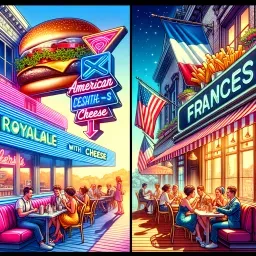I don’t remember asking you a goddamn thing!

0
0
0
0
- Meaning
- The meaning of this phrase reflects feelings of frustration and a demand for respect. It speaks to human dignity and the need for acknowledgment in interpersonal relationships, highlighting themes of power dynamics and personal boundaries.
- Allegory
- The image captures the essence of standing firm in one's beliefs and asserting boundaries. The shadowy figures signify challenges or criticisms one faces, while the broken chain symbolizes liberation from constraints. The dramatic lighting enhances the emotional impact, aligning with the confrontational tone of the phrase.
- Applicability
- This phrase can be applied in personal life when asserting one’s boundaries or standing up to disrespect. It serves as a reminder to others that their opinions may not dictate one's self-worth.
- Impact
- The phrase has had a significant impact on pop culture and is often quoted to express defiance and assertiveness, resonating with individuals standing up for themselves or rejecting unwanted opinions.
- Historical Context
- The phrase originated from the 1972 film "The Godfather," which was released during a period of significant cultural changes in America, reflecting themes of power, family, and authority.
- Criticisms
- This phrase has sometimes been criticized for promoting aggressive communication styles and a lack of civility. Critics may argue that dismissing questions or opinions outright escalates conflicts rather than fostering dialogue.
- Variations
- Variations of this phrase exist across cultures, often where direct confrontation is valued, while some cultures emphasize indirect communication. In Eastern philosophies, there might be a more harmonious approach to addressing similar sentiments.
-

Goddamn it, what’s happening to us, man?
-

Now, if you’ll excuse me, I’m going to go home and have a heart attack.
-

Your identity is your most valuable possession. Protect it.
-

Bring out the gimp.
-

Do you know what they call a Royale with Cheese?
-

If my answers frighten you, then you should cease asking scary questions.
-

I’m not a prize to be won!
-

You never fing mind, man. That’s your fing business.
-

Just because you are a character doesn't mean that you have character.
-

Be cool, Honey Bunny.
-

We’re gonna be like three little Fonzies here. And what’s Fonzie like? Cool.
No Comments